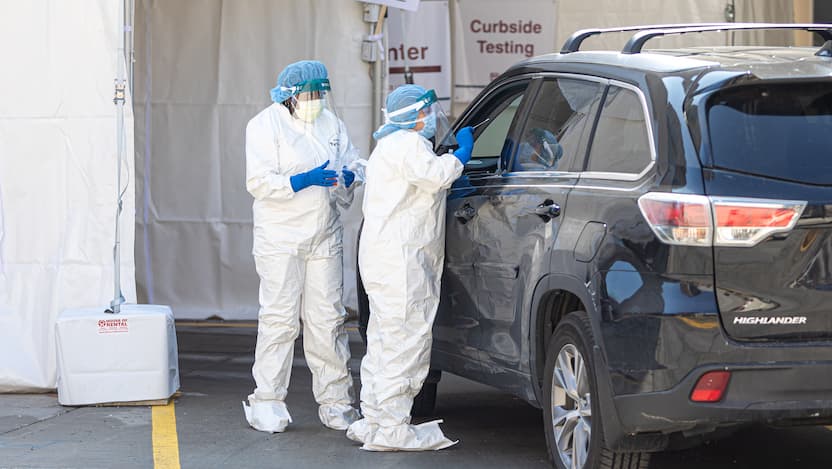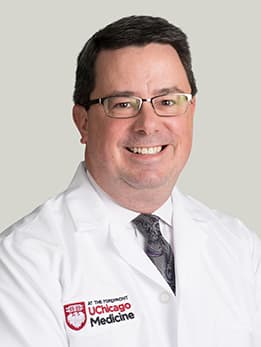Early data suggests many individuals still COVID+ after 5 days of isolation, challenging return-to-work recommendations

Researchers at the University of Chicago Medicine released preprint data on Medrxiv indicating that despite feeling well enough to work, more than 40% of vaccinated healthcare workers still tested positive for COVID-19 five to 10 days after their symptoms began.
The results, the team said, may indicate that a large number of people with COVID-19 are still likely contagious after the first five days of their illness, even if they feel fully recovered. Having them return to work before 10 days of isolation without a negative rapid antigen test may increase the risk that they spread the virus to others, the researchers said.
The data was released February 2 and has not yet been peer-reviewed.
At odds with current CDC guidelines
The research follows revised Centers for Disease Control (CDC) isolation recommendations from January, which said individuals with COVID-19 could end their isolation after five days if they were fever-free for 24 hours and experienced either mild-but-improving symptoms or had no symptoms at all.
The CDC did not recommend people take an additional COVID-19 test after day five, but said anyone who left isolation should wear a well-fitting, high-quality mask around people until they passed the 10-day mark. The public health agency did say anyone who choose to take a rapid antigen test should remain isolated for the full 10 days if the results were positive.
But groups of doctors cautioned that those recommendations were unsafe, arguing previous studies had shown some people were still contagious until day 10. Without a negative test, critics said, individuals following the new CDC guidelines could return to work while contagious, putting others at risk for contracting the SARS-CoV-2 virus.
“The CDC isolation recommendations were based on studies collected mostly before the Omicron variant and before people had been vaccinated or infected. In those situations, symptoms generally didn’t start until a person had already reached their peak virus load,” said co-author Emily Landon, MD, Executive Medical Director, Infection Prevention and Control at UChicago Medicine, who was the paper’s first author. “In those cases, ending isolation after five days might be reasonable, since earlier data showed few people still had live virus at that point. But with Omicron, we’re potentially seeing earlier symptoms — even before the peak virus load has been reached — which starts the isolation clock several days earlier and leaves more people contagious on days six to 10.”
In discussion with public health and infectious disease experts, UChicago Medicine developed a policy that allowed fully vaccinated healthcare workers with mild COVID-19 to return to work after five days of isolation. Unlike the CDC’s recommendations, however, UChicago Medicine employees were required to take a rapid antigen test at the hospital as an extra precaution. Health system employees whose rapid tests remained positive were not able to go back to work until they tested negative or they reached day 11, whichever was sooner. Those who returned early had to follow strict masking and distancing guidelines.
The research team examined 309 rapid antigen tests performed on 260 UChicago Medicine healthcare workers between January 2 and January 12, 2022. Those employees all tested between days five and 10 following the start of their COVID-19 symptoms (or the date of the first positive COVID-19 test, if they were asymptomatic). The results showed 43% of rapid tests during the so-called “early-return period” were positive, even though individuals felt well enough to work.
Vaccines and omicron are changing the game
The results, the research team said, have implications for the CDC’s recent return-to-work guidance.
“The current CDC guidelines place little emphasis on the need for a negative test to exit isolation,” said Michael Mina, MD, PhD, Chief Science Officer of eMed and one of the paper’s co-authors. “The guidance for five days of isolation is based on information gleaned with earlier variants. Now, symptoms — and thus isolation — begin much earlier in the course of a viral infection. This means that many people remain at or near their peak infectiousness at the very time they are exiting isolation.”
UChicago Medicine’s data also showed individuals who’d received a COVID-19 vaccine booster were significantly more likely to test positive on their first attempt to return to work.
The research team hypothesized that vaccinated and boosted individuals may experience symptoms earlier in the disease course than those who have not been vaccinated, since their immune system more rapidly recognizes and responds to the viral attack. As a result, immunized individuals may begin experiencing symptoms earlier, before their viral load reaches its peak. The same group may also get better before the virus completely clears their system, the team said.
“It’s possible that those who received boosters recently may react even faster than those who haven’t been boosted,” said Stephen G. Weber, MD, UChicago Medicine’s Chief Medical Officer and an infectious disease specialist who was among the paper’s authors. “Since they may feel less sick overall, that may lead them to leave isolation while the virus is still shedding and they are still contagious.”
The advantages of adding rapid antigen testing
The health system team said using rapid antigen testing prior to ending isolation or returning to work will help identify people who have a lower risk of transmitting COVID-19. But they stressed it’s essential to also follow existing public health measures, such as strict masking.
“The CDC guidance to wear a well-fitting mask all the time on days six to 10 should reduce the risk of transmission, but many people outside of healthcare don’t have access to good masks and everyone needs to eat and drink, so this strategy may not be as safe as previous studies indicated,” said co-author Caroline Guenette, MS, APNC, Director of Occupational Health at UChicago Medicine. “Testing negative on a rapid antigen test at the end of illness would make early release from isolation a lot safer.”
Rapid antigen tests, which provide results at home in 15 minutes, typically show a positive result only when a person’s viral load is at its highest. That makes them a better gauge of whether someone could leave isolation. More sensitive PCR tests, which can take several days to process and can produce positive results long after someone’s infectious period ends, are better fits to diagnose COVID-19, rather than clear someone to return to work, they said.
“Without checking a rapid test to be sure your viral load is past its peak, ending isolation early may increase the risk of infecting others,” said Rachel Marrs, DNP, RN, Director of Infection Control and Prevention at UChicago Medicine and another co-author. “That would counteract the hope that ending isolation early would reduce the staffing issues plaguing nearly every industry.”
“This study highlights that the timing of symptoms and contagious period of COVID-19 infection in vaccinated and boosted individuals may be different than what is seen in unvaccinated individuals,” said co-author Allison Bartlett, MD, MS, Associate Medical Director, Pediatric Infection Control Program at UChicago Medicine. “By relying only on ‘days since symptoms started’ to return to work, we may be letting contagious individuals back into the workplace prematurely. The number of individuals who still have positive antigen tests on days eight and nine supports the critical need for diligent mask wearing and social distancing when returning from isolation.”
The study, “High Rates of Rapid Antigen Test Positivity After Five Days of Isolation for COVID-19,” has not yet been peer reviewed. Disclosure: Dr. Mina is the Chief Science Officer of eMed, a digital healthcare company that verifies and reports at-home tests. He is also on the board of 4Catalyzer, which supports start-ups including Detect, a company that makes a molecular COVID test.

Emily Landon, MD
Dr. Emily Landon specializes in infectious disease, and serves as Executive Medical Director for infection prevention and control.
Learn more about Dr. Landon.
Stephen Weber, MD
Stephen Weber, MD, has expertise in the management of a wide variety of infections.
Read more about Dr. Weber
